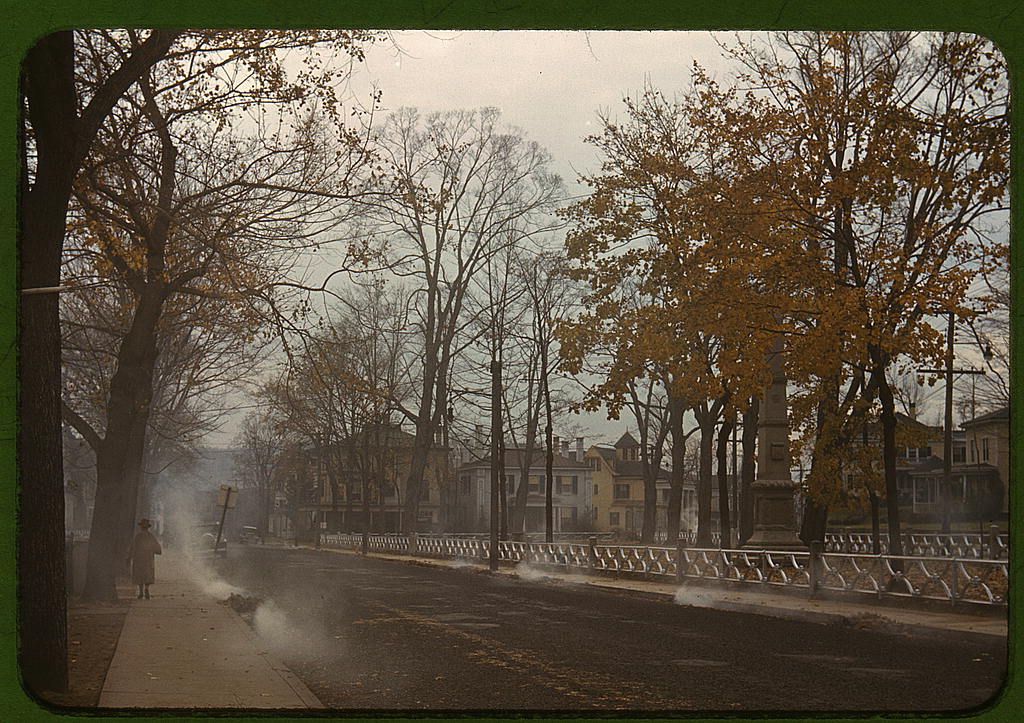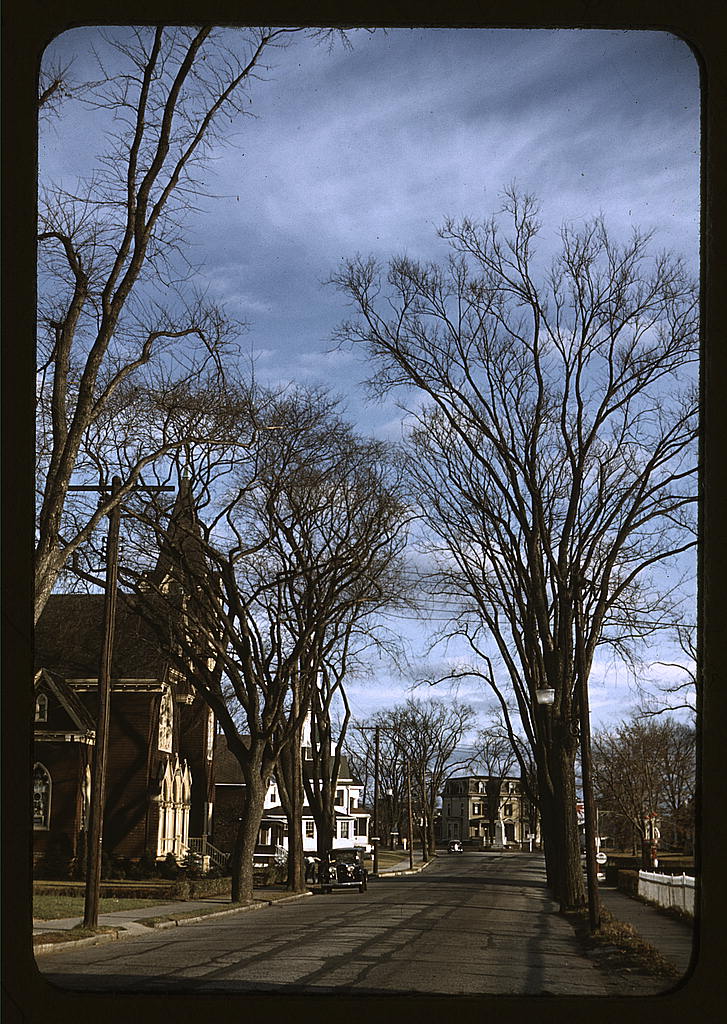.

Burning the autumn leaves in Norwich, Connecticut: photo by Jack Delano, November 1940 (Farm Security Administration/Office of War Information Collection, Library of Congress)
In these few years
since her death I hear
mother's voice say
under my own, I won't
want any more of that.
My cheekbones resonate
with her emphasis. Nothing
of not wanting only
but the distance there from
common fact of others
frightens me. I look out
at all this demanding world
and try to put it quietly back,
from me, say, thank you,
I've already had some
though I haven't
and would like to
but I've said no, she has,
it's not my own voice anymore.
It's higher as hers was
and accommodates too simply
its frustrations when
I at least think I want more
and must have it.
Robert Creeley (1926-2005): Mother's Voice, from Mother's Voice, 1981
My mother's people were all Maine people, they had specific ways of saying things, they spoke with a particular humor. It was a way of speaking that I learned as a child from my increasingly single parent... The ways I placed the world were thus given a form in language from early on. And in emotional moments I now find I increasingly return to that language that's particularly local to my childhood and to the place where I was brought up.
-- Robert Creeley, in Tom Clark: Robert Creeley and the Genius of the American Common Place, 1993
My mother's people were all Maine people, they had specific ways of saying things, they spoke with a particular humor. It was a way of speaking that I learned as a child from my increasingly single parent... The ways I placed the world were thus given a form in language from early on. And in emotional moments I now find I increasingly return to that language that's particularly local to my childhood and to the place where I was brought up.
-- Robert Creeley, in Tom Clark: Robert Creeley and the Genius of the American Common Place, 1993

Street scene, Brockton [?], Massachusetts: photo by Jack Delano, c. November/December 1940 (Farm Security Administration/Office of War Information Collection, Library of Congress)

Robert Creeley: Mother's Voice (1981), cover by Tom Clark: photo by Gary Parrish/Farfalla



13 comments:
Terrific.. all those alternating long short vowel sounds are terrific.
All the photographs (esp. the burning autumn leaves) and your cover (do you happen to have that aquarium in the background?) as well
a bit more on 'mother's voice'..
home village--
mother's cloth-pounding
faintly heard
-- Issa
(Issa wrote this nostalgic haiku long after his mother's death. In Japan and Korea, fulling-blocks were used to pound fabric and bedding. The fabric was laid over a flat stone, covered with paper, and pounded, making a distinctive sound.)
-- courtesy David G. Lanoue
.......
cirrus clouds
unable to recall
mother's voice
Tom,
In these few years
since her death I hear
mother's voice. . .
How beautiful the way RC puts the syllables/words (one after the other) into lines, loading every rift w/ such ore.
10.8
light coming into sky above black plane
of ridge, silver of planet above branch
in foreground, wave sounding in channel
kind of “cover,” additional
notes that this color
which happening, as follows,
is to cause something
whiteness of fog to the left of point,
white half moon in cloudless blue sky
was just thinking of re:turning to
productions just like that:
run "it" off on a mimeo 50 copies
staple "it" together
send it out to say 12 readers...
and just move along (into) the next piece.
Creeley was one of the best.... pinned things down,
precisely.... and cld 'see' more with one eye than
ALL of the Jacks that are now "writing" via their
Pentagon Poetry Club
(last time I burned leaves here... the police AND a fire-truck came... they stood around smelling the smoke and one said: "reminds me of my child-hood" then put out the smoldering leaves and gave me a $25 dollar ticket !
nice pieces/grouping. Now? going to my Robert Creeley "stash" and spend-the-day.
This seems fall in very naturally after the wonderful sequence of Hardy poems.
My cheekbones resonate
with her emphasis
This sentence seems to surface in the poem's skin like a splinter.
I always like to be reminded that a body is writing.
Ed,
"Creeley was one of the best.... pinned things down, precisely.."
I agree, you old horse thief, but the wagon master in charge of the poetry caravan at the You Dub Corral back in the early 70s didn’t share that opinion, I’m afraid. I seem to remember him saying something like he wished Bob could try writing a line of more than ten words, something like what most of them PNW protégé poets (bearing badly the TR brand, by the way) were writing at that time, lines that never seemed to end and when they did, you were glad they had finally reached the end of their line.
My Voice
I call her frequently
to hear it. It is
so soft except for the s.
They sound double sharp. I hear
myself say it, too.
Soften your s
I've been told. She speaks
like a snake
a beautiful garter snake
in the garden.
Once, at Lone Cone
down at Gurley Ditch
I saw a pretty lime green snake
take a delicate drink. It seemed
surprised to see me
but it wasn't scared. It wouldn't
let me stare into her eyes.
It took off like a bee
like a horse
skittery butterfly insistent.
Something demanding
in her voice. She's not there
not quite with the others
in the bombed-out shelter.
Her voice trails off.
Please don't tell her
what to do. She is brave enough.
She has words
brown, blue, orange, and purple.
She would say blue
I would say purple
but there is always orange.
Yellow is not spoken of.
She wears turquoise
and magenta.
She wanted her name to be Carmen
when she was little
not Martha. She wanted scarlet
and not off-white.
Lovely testimony all round, many thanks to all.
Robert Creeley grew up in Massachusetts, in a household dominated by women -- his mother and grandmother, his older sister, and a longtime housemaid. This, perforce -- his father had died when he was four.
In our conversations he spoke more than once of "...the Puritan aura of where I grew up.."
Later on, he said, "I was interested in the intellectual aspects of Zen and was certainly moved by friends who were involved with it but I personally thought it was just one more Puritanism. I grew up in a New England Puritan situation and I didn't need more rules. I had all the rules I could deal with."
The denials and refusals and self-imposed stringencies reflected in this poem --
... and try to put it quietly back,
from me, say, thank you,
I've already had some
though I haven't
and would like to
but I've said no, she has,
it's not my own voice anymore
-- would become a theme interwoven through the poems of his later years.
There is, for instance, this arresting poem writ some two decades later:
Generous Life
Sit down, says generous life, and stay awhile!
although it's irony that sets the table
Another late poem called "On Vacation" hints of the poet's lingering uneasiness with questions of need and appetite.
I am always afraid
of having more. Hence a true
Puritan, I shall never rest from my labors
until all rest with me, until I am
driven by that density home.
In our talks I asked if he had been influenced by the language of the Protestant hymn books.
"For me the interest wasn't the Bible, it was certainly the hymnal -- I remember the hymns far better than any otherwise theological discussion. The hymns I liked both as melodies and as language. I mean, I really loved them. You know, the classic 'On a hill far way stands an old rugged cross,/ An emblem of suffering and shame,' etc. Or 'Yield not to temptation...' Or 'Brighten the corner where you are' -- I really liked that melody, really loved that. In fact I can remember a really comfortable clutch of those. Oh -- 'I walked in the garden', that was one of my dear favorites."
His metric sense surely has these memories of the hymn books -- along with the abiding example of Hardy -- among its several sources.
Bob's later poems, I think, have been undervalued largely because they address the fact of aging without the customary softening or gloss.
By 2004 he was frank in admitting he no longer had anything to "say", beyond his grappling with this central salient fact:
"Aging is certainly a 'theme' I've come to, which even the poems of my thirties, with their now and then 'When I have fears that I may cease to be' vibes, really didn't touch. Being old is very different than thinking about being old. It's a state like Maine or happiness. You'll know it when you get there but not before."
"It's a state like Maine or happiness. You'll know it when you get there but not before."
Thanks Tom for all such memories.
". . . Or 'Brighten the corner where you are' . . . Oh -- 'I walked in the garden', that was one of my dear favorites."
10.9
light coming into cloud above blackness
of ridge, bird slanting toward branches
in foreground, sound of wave in channel
changes because its form is
preserved, successive
primary colors, given image,
this point that it is
silver of sunlight reflected in channel,
shadowed green canyon of ridge above it
And now, Creeley and Hardy. This post is wonderful - start to finish!
Thanks, Marcia.
This poem really brings back the poet for me.
And the line Steve picked out --
"... being old. It's a state like Maine or happiness. You'll know it when you get there but not before."
-- the dry RC wit at its best.
Post a Comment